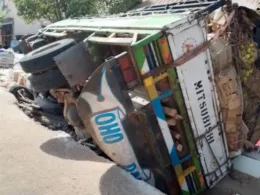Ghana has a vibrant Senior High School scene, with the country’s 16 regions boasting an impressive roster of reputable schools.
The student population in these schools largely consists of young adults who are at a crossroads, either preparing to advance to university or considering other paths after graduation. They are daring, complex, and full of adventure. It’s a lively environment.
However, just a week ago, one student was lost in a situation that could have been avoided. While scrolling through social media, I came across a post suggesting that two students had an altercation over whose father was wealthier.
Initially, I chuckled and dismissed it, thinking, “A rich dad, poor dad argument? If any of your parents were richer or poorer, you wouldn’t be at the same school.”
A day or two later, I saw a video posted by GHOne TV that immediately captured my attention. My heart was shattered after watching the entire video.
It turned out that the story I had quickly dismissed was far more serious than I had imagined.
The incident involved a violent clash between two student groups with a long-standing feud. What makes this tragedy even more painful is the role that inaction played. The peaceful atmosphere at O’Reilly Senior High School in Accra, Ghana, was shattered by a fatal altercation that claimed the life of a student.
Reports suggest that some teachers and staff were present during the altercation but felt powerless to intervene. Their hesitation to step in and diffuse the situation highlighted a disturbing reality: teachers in Ghana have limited authority to discipline students due to constraints imposed by the Ghana Education Service (GES) regulations. This incident also underscores the urgent need for improved medical facilities and first-aid preparedness in schools across the country.
I was initially unaware of these issues, which led me to ask questions. People were kind enough to provide answers, but I ended up with even more questions, some of which were rhetorical.
One thing I learned is that in recent years, Ghana’s educational policies have undergone significant changes, particularly regarding student discipline. Under GES rules, teachers are prohibited from administering corporal punishment or engaging in any form of physical reprimand, which is commendable.
While these policies aim to prevent abuse and create a safe learning environment, they have left teachers with very limited tools to enforce discipline in the classroom.
Teachers are encouraged to use counseling and guidance methods to address student misbehavior. However, in cases of extreme or violent conduct, such as what happened at O’Reilly High School, these methods often prove inadequate.
Consequently, many teachers become mere spectators, unsure of how to intervene in escalating situations. Although school authorities were aware of the tension between the rival student groups, the absence of proper disciplinary tools left them with little authority to prevent the conflict from escalating into violence.
The O’Reilly High School tragedy also revealed a glaring gap in emergency medical assistance. The student who succumbed to his injuries might have had a chance of survival if proper first aid had been administered immediately after the stabbing. Unfortunately, many schools in Ghana, including O’Reilly High School, lack basic medical facilities or trained staff capable of providing emergency care.
Had the school been equipped with a well-stocked first aid center or an on-site clinic, quick intervention might have stabilized the victim, preventing further blood loss. Even a trained first-aid responder on campus could have made a significant difference. In situations involving severe injuries, the minutes immediately following the trauma are critical in determining whether a victim will survive.
Additionally, the lack of readily available and fully operational ambulance services exacerbated the severity of the situation. The delay in transporting the injured student to a hospital may have further reduced his chances of survival. This incident highlights the pressing need for schools across Ghana to have access to reliable, fully operational ambulance services that can be called upon in emergencies.
When time is of the essence, a functioning ambulance service can make the difference between life and death. Schools should have clear emergency protocols that include direct communication with ambulance services and hospitals. This would ensure that, in the event of an emergency, medical help arrives promptly and victims receive the care they need as soon as possible. A well-coordinated system between schools and local healthcare providers is essential to prevent similar tragedies in the future.
This tragedy serves as a chilling reminder that when rules meant to protect students undermine the authority of teachers, and when schools lack basic health facilities, the results can be catastrophic.
Allowing violent altercations to brew unchecked in schools not only threatens the safety of students but also disrupts the entire learning environment. A school should be a place where students feel safe, valued, and guided by responsible adults. However, when those adults are stripped of their ability to enforce order and there are no proper healthcare measures in place, chaos often ensues, sometimes with tragic consequences.
Discipline is not just about punishment; it is a tool for shaping responsible, respectful, and productive citizens.
For schools to effectively serve as institutions of learning and character-building, students must be held accountable for their actions. Discipline serves as a deterrent to misconduct, fosters respect for authority, and ensures the safety of both students and staff.
Furthermore, schools must be adequately equipped to handle emergencies. First-aid facilities, along with trained personnel, should be a standard requirement for all educational institutions.
In the case of O’Reilly High School, the lack of both proper disciplinary measures and medical facilities contributed to the tragic loss of life. With early intervention in both conflict management and medical care, the outcome could have been very different.
Written By: Nana Agyeiwah










Join our Channel...